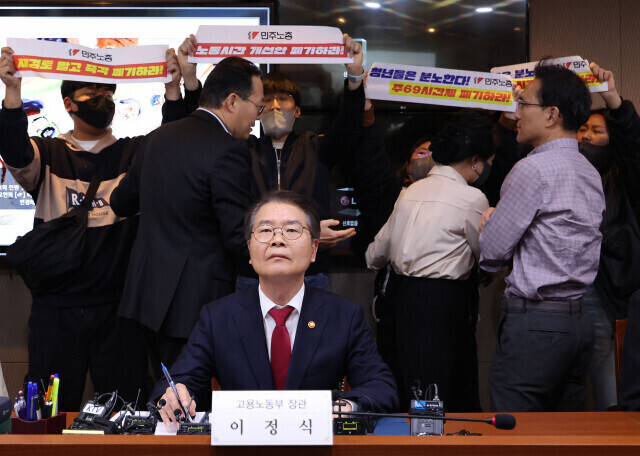hankyoreh
Links to other country sites 다른 나라 사이트 링크
S. Korea ranks near bottom of OECD for work-life balance, study shows

A study has found that work-life balance in South Korea is one of the worst among OECD countries, with South Korean workers enjoying limited “time agency,” or the ability to independently control and allocate work and leisure time, due to long working hours.
According to the article “A Categorization of Time Guarantee in Work-Life Balance,” authored by Gangseo University social welfare professor Noh Hye-jin and published in Health and Social Welfare Review released by the Korea Institute for Health and Social Welfare, South Korea was categorized as a country where workers work excessively long hours and enjoy little time with family — in other words, a country where the level of work-life balance guarantee is low. The study came to this conclusion after scores based on 26 indicators and institutions related to working time and family time in 2021 for 31 OECD countries were compared.
Noh first divided the 31 countries being compared to four groups: countries where both working time and family time were highly guaranteed; countries high in only family time-oriented security; countries high in only working time-oriented security; and countries low in both working time-oriented security and family time-oriented security. Along with the US and Greece, South Korea was classified into the fourth group, determined to have low guarantees for both working time and family time, with workers working excessively long hours and enjoying little family time.
Notably, South Korea was found to have the third-lowest level of appropriate working time guarantee, in part due to its long working hours (1,915 hours a year) compared to other countries in the Organisation for Economic Co-operation and Development, or OECD.
In terms of family time, South Korea scored 0.37 points out of 1, placing 20th out of the 31 countries studied. This was because South Korea scored low on personal time off utilization rate (0.18 points) and income replacement rate for time off (0.4 points), even though it scored high on length of institutionally guaranteed personal time off (0.93 points).
This demonstrates the importance of time agency, and especially social conditions that allow for the reduction of working time, for laborers. A guarantee of appropriate income levels that didn’t threaten workers’ livelihoods even if they reduced the amount of time they worked, as well as social policies that enabled workers to choose leisure time over working time, determined which group countries were categorized into.
For example, countries such as Norway and Sweden ranked among the highest for work-life balance thanks to guaranteed appropriate working hours and income, which contributed to shorter working hours and longer family time.
While the South Korean government announced its plan to restructure working hours this past March, emphasizing that it would help South Korean workers secure time agency, concerns have been raised that it may extend working hours in practice by making overtime work more flexible. Noh commented, “In order to guarantee work-life balance in South Korean society, efforts to guarantee appropriate working hours are desperately needed.”
Time inequality among workers is also widening by type of employment. According to the findings of an analysis by Noh using time use survey data, the average amount of time spent on paid labor per day in 1999 by a wage earner was 450.8 minutes, but had greatly decreased to 341.7 minutes by 2019.
At the same time, the total amount of hours spent working per day for non-wage earners like the self-employed or the independently employed had only fallen from 408.9 minutes in 1999 to 357.8 minutes in 2019, not keeping pace with wage earners.
While work times have consistently gone down on account of systematic changes like the implementation of the 40-hour work week and 52-hour maximum work week, workers on the margins or in unstable employment have not been able to reap the benefits of the reduction in working hours.
By Kim Hae-jeong, staff reporter
Please direct questions or comments to [english@hani.co.kr]

Editorial・opinion
![[Column] When ‘fairness’ means hate and violence [Column] When ‘fairness’ means hate and violence](https://flexible.img.hani.co.kr/flexible/normal/500/300/imgdb/original/2024/0516/7417158465908824.jpg) [Column] When ‘fairness’ means hate and violence
[Column] When ‘fairness’ means hate and violence![[Editorial] Yoon must stop abusing authority to shield himself from investigation [Editorial] Yoon must stop abusing authority to shield himself from investigation](https://flexible.img.hani.co.kr/flexible/normal/500/300/imgdb/original/2024/0516/4417158464854198.jpg) [Editorial] Yoon must stop abusing authority to shield himself from investigation
[Editorial] Yoon must stop abusing authority to shield himself from investigation- [Column] US troop withdrawal from Korea could be the Acheson Line all over
- [Column] How to win back readers who’ve turned to YouTube for news
- [Column] Welcome to the president’s pity party
- [Editorial] Korea must respond firmly to Japan’s attempt to usurp Line
- [Editorial] Transfers of prosecutors investigating Korea’s first lady send chilling message
- [Column] Will Seoul’s ties with Moscow really recover on their own?
- [Column] Samsung’s ‘lost decade’ and Lee Jae-yong’s mismatched chopsticks
- [Correspondent’s column] The real reason the US is worried about Chinese ‘overcapacity’
Most viewed articles
- 1Could Korea’s Naver lose control of Line to Japan?
- 2[Column] Welcome to the president’s pity party
- 3[Column] US troop withdrawal from Korea could be the Acheson Line all over
- 4Naver’s union calls for action from government over possible Japanese buyout of Line
- 5[Editorial] Korea must respond firmly to Japan’s attempt to usurp Line
- 6Korea cedes No. 1 spot in overall shipbuilding competitiveness to China
- 7[Editorial] Yoon must stop abusing authority to shield himself from investigation
- 8[Column] When ‘fairness’ means hate and violence
- 9Korean opposition decries Line affair as price of Yoon’s ‘degrading’ diplomacy toward Japan
- 10Second suspect nabbed for gruesome murder of Korean in Thailand, 1 remains at large